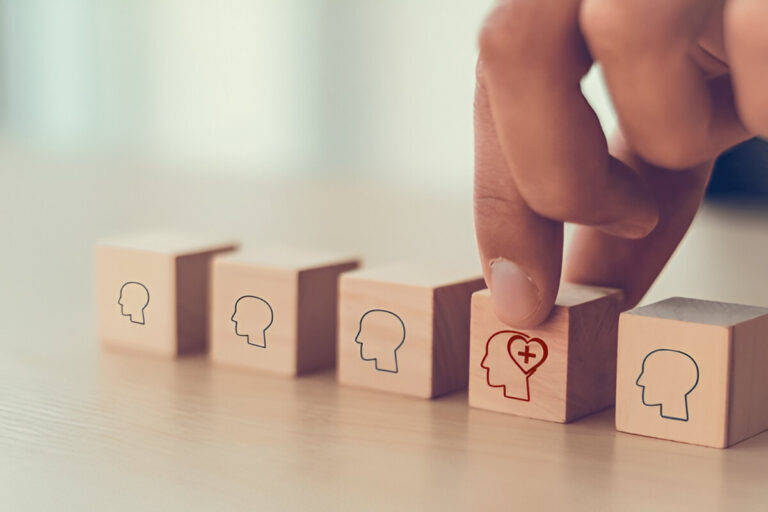You can’t discuss health and wellness without considering mental health. Almost one in five adults in the United States has a mental illness or mental health condition. That is close to 52 million people.
Mental health isn’t only about whether a person has a mental illness or not. Our lives, work and time with our family are all influenced by our well-being. The discussion is more important now than it has ever been. The main feeling people had in 2021 was languishing. According to BetterUp’s research, more than half of workers did not have mental illness, but they also weren’t thriving.
Since the pandemic has made us focus on physical health like never before, it’s time to pay attention to the other key aspects of well-being. The conversation around mental health awareness has never been as public, as prevalent, or as important. Still, understanding mental health is essential for learning how to look after yourself.
Learn what mental health awareness is and how it makes a difference in your personal and professional life in this article.
Table of Contents
ToggleWhat does mental health awareness mean?
So what does mental health awareness mean, and how do you promote it?
Mental health awareness is the ongoing effort to reduce the stigma around mental illness and mental health conditions by sharing our personal experiences.
Often, because of misconceptions about mental health and mental fitness, people often suffer in silence and their conditions go untreated. Mental health awareness is an important social movement to both improve understanding and increase access to healthcare.
How can raising mental health awareness help?
Mental health awareness is critical to promoting mental health treatment and behavioral health. It is important to have this conversation for mental health to move toward a more proactive approach.
At the moment, we only refuel when our tanks are empty. When we pay more attention, we can notice when we feel “off” in the same way we do when we’re sick.
Here are four important benefits of mental health awareness:
1. Helps you make sense of what is happening to you
At times, knowing what is wrong can be a relief. Even though the term has a negative connotation, it’s just a way to describe several symptoms that happen at the same time.
Especially with mental health conditions, which are difficult to pinpoint and sometimes impossible to find on a test, a diagnosis can be incredibly validating. It means you don’t have to cope on your own and helps you find support for treatment. Notice any changes in your health. You could notice that your mental health gets worse when you use social media.
2. Begins a discussion
Mental health awareness is an ongoing conversation, but up until recently, it’s only been had in whispers. As many mood and anxiety disorders involve distorted thinking, simply talking about them can be very helpful.
Building a support network and speaking with a licensed mental health professional is critical to alleviating symptoms of many mental health conditions.
Unfortunately, stigma stops people from talking about their experiences. It can be hard to seek help at work or in other places that might be tougher because of a mental health issue.
3. Better education
Family members, parents, caregivers, employers and loved ones should understand how mental health affects someone every day. However, while mental health conditions can make daily life more difficult, they also don’t have to prevent you from having a fulfilling and engaging life.
If your loved ones appreciate the importance of mental health care, you find it easier to do what you need for your own well-being.
4. Promotes mental fitness
A lot of us tend to see mental health as only linked to mental illness. However, it’s possible to have a mental health condition and be mentally fit, and the absence of a mental health condition doesn’t necessarily ensure mental fitness.
Expanding our understanding of mental health issues and wellness to incorporate mental fitness, a proactive approach to emotional health, well-being, and cognitive agility. It helps us live more meaningfully, clearly and passionately. Reducing the stigma around mental health is an important step to embracing mental fitness.
3 Essential tips to promote mental health awareness
How can individual people, especially non-clinicians, make a difference in promoting mental health awareness? A big aspect of it is learning how to openly discuss mental health with others.
If we don’t discuss mental health and fitness, we let stigma endure. Because the subject is rarely discussed, people find it tough to focus on their mental health.
Here are several ideas to promote mental health awareness within your community.
Let your thoughts be known to others.
How frequently do you notice someone using a mental health day? How many times do you notice them admitting the truth about it? A lot of us tend to think that our physical health matters more than our mental health.
We can stay home when we’re sick, but not when we’re emotionally tired or exhausted. When you plan your next break, let your team know that you’re doing it for your mental health.
If you advocate for your mental health, you are encouraging others to do the same. You may give others the motivation to do the same.
Find out more about mental health.
Take the time to learn about mental health and mental fitness. Besides, make an effort to tell them apart. Learn about common mental health conditions, signs of burnout, and how to take care of yourself when you’re experiencing symptoms.
Being aware of your own warning signs can help you notice when you’re starting to feel upset. If you come across anything that could help others, pass it along to those you know.
Have a conversation with a coach.
I enjoy working for BetterUp because each person here has a coach. It’s not uncommon for me to discuss what I’ve learned in coaching sessions with anyone I meet, including managers, colleagues, people from other departments or executives.
At BetterUp, we truly have a culture of personal development and mental fitness. It’s fine to spend time on the Inner Work®, as this helps us succeed in the things we do outside.
Why should we pay attention to mental health?
Talking about mental health isn’t limited to those who have mental health disorders. It affects our social, emotional, physical and mental health.
A lot of individuals don’t obtain the help they require because of the prejudice against mental health. There are people who don’t understand that treatment is possible. Quiet suffering makes them feel alone and powerless. We don’t experience their greatness.
In the United States, suicide is among the top three causes of death each year. It has been increasing in recent years. Everyone is affected by this, though some groups face a much greater risk.
Each suicide is a terrible loss. Suicide takes a big toll on society. It’s not only about losing money; above all, it destroys the lives of those who survived the victim.
It’s hard to know what effect our actions will have on someone else, but if spreading awareness can prevent a death, it is absolutely worth it.
More help for mental health
If you look, you can find groups where people go to discuss similar issues. Certain support groups are designed for people dealing with schizophrenia, anxiety, depression and substance use disorders.
As usual, it’s important to speak with your doctor or a trained mental health professional. Always let your doctors know how you’re feeling. Your general health matters a lot.
Conclusion
In conclusion, mental health awareness is not just a necessary conversation; it’s a vital component of our overall well-being. By understanding and promoting mental health, we can break down the barriers of stigma and silence, creating a supportive environment for those struggling with mental health conditions. We can all support the movement by talking about it, learning more or encouraging open dialogues. By continuing to discuss and learn about this subject, we inspire ourselves and others to create a healthier and more welcome community.
FAQs
What are some clues that I ought to concentrate on my mental health?
Typically, these signs are sadness that won’t go away, too much stress, changes in eating or sleeping, trouble focusing and avoiding people. If you find these symptoms are interfering with your daily activities, you might want to get help.
How should I help someone who is having problems with their mental health?
Don’t judge them, encourage them to look for care and help them locate support groups. Being with someone can often have a big impact.
Where can I find help for mental health?
There are different resources such as support hotlines, nearby groups and medical experts, available. The National Alliance on Mental Illness (NAMI) and MentalHealth.gov are websites that supply useful information and support choices.
Can mental health conditions affect my physical health?
Yes, mental health and physical health are closely linked. If mental health is poor, it can result in physical symptoms and make someone more likely to develop heart disease, obesity and diabetes.
How can workplaces promote mental health awareness?
Workplaces can implement training programs, create mental health days, provide access to mental health resources, and foster a culture of open communication where employees feel safe discussing their mental well-being.





